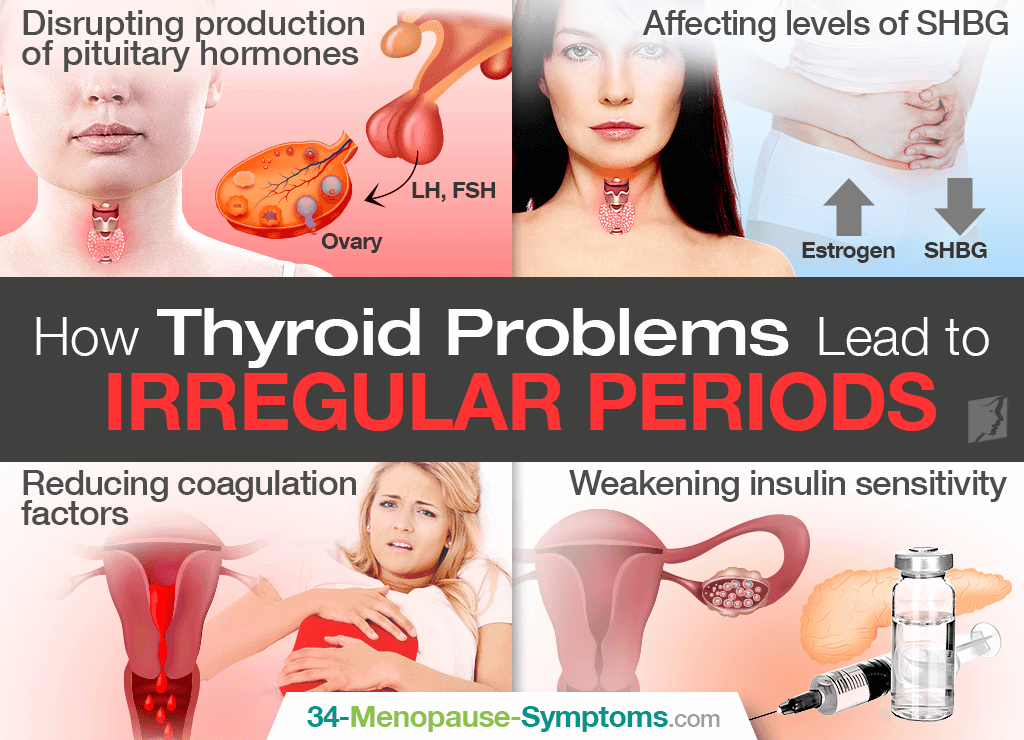The thyroid is a butterfly-shaped, endocrine gland found in the neck. The hormones it produces govern various bodily functions, such as how fast you burn calories and heartbeat, as well as other hormonal interactions. Its actions are controlled by the pituitary gland, which is stimulated by the hypothalamus in the brain.
Continue reading to learn more about the relationship between the thyroid and irregular periods to get back to optimized menstrual cycle health today.
What are Thyroid Problems?
Thyroid problems include goiter, which is the enlargement of the thyroid gland; nodules, or lumps in the gland; thyroiditis, swelling of the gland; and thyroid cancer.
However, the two most commonly associated with irregular periods are hypothyroidism, which is when the thyroid gland does not produce enough of thyroid hormones, in addition to hyperthyroidism, the overproduction of thyroid hormones.
How Thyroid Problems Lead to Irregular Periods
Without a doubt, the thyroid can cause irregular periods. Here's how:
Disrupting production of pituitary hormones
Thyroid disorders disrupt luteinizing hormone (LH), follicle-stimulating hormone (FSH), and prolactin. LH and FSH are involved in a feedback loop that regulates the menstrual cycle and ovulation. Their imbalance can lead to anovulation - lack of ovulation, which then results in a progesterone deficiency as the ovaries are the main producer of progesterone.
Affecting levels of sex hormone binding globulin (SHBG)
SHBG is a protein that binds to hormones - such as testosterone and estrogen - so that they are not bioavailable, or functional, in the body. Hypothyroidism deregulates periods by reducing SHBG, thus augmenting estrogen levels and instigating heavier periods. On the other hand, hyperthyroidism increases SHBG, causing lighter periods.
Reducing coagulation factors
Coagulation factors are proteins essential for blood clotting. When factors are low, this can cause heavy bleeds, like with hypothyroidism. When coagulation factors are increased, lighter periods occur, such as the case with hyperthyroidism.
Weakening insulin sensitivity
Moreover, hypothyroidism causes irregular periods by weakening insulin sensitivity, which can lead to polycystic ovary syndrome (PCOS). This condition makes the ovaries produce more androgen hormones and evokes a plethora of other hormonal imbalance symptoms, such as cystic acne, hirsutism, voice changes, and more.
What Can I Do for Treatment?
Treatment for irregular periods starts with identifying the underlying cause. In women passing through the menopausal transition, hormonal imbalance often causes thyroid dysfunction.
Start with simple lifestyle adjustments that promote overall endocrine system health, including incorporating regular exercise 30 minutes a day, five days a week into your schedule as well as partaking in healthy habits of decreased alcohol and caffeine consumption. Also, lower your intake of refined carbohydrates, which can worsen or lead to insulin sensitivity.
For optimized results, implement the use of alternative medicines proven to balance hormones. These include phytoestrogenic supplements of black cohosh and dong quai as well as hormone-regulating supplements, like Macafem, which nourish the endocrine glands to produce their own hormones, thus replenishing any hormonal gaps and relieving various symptoms.
Key Takeaways
By disrupting pituitary hormone production, affecting SHBG levels, reducing coagulation factors, and weakening insulin sensitivity, thyroid disorders can cause irregular periods. In general, frequent or heavy periods, shortening of a cycle, or periods lasting longer than normal would suggest hyperthyroidism. On the other hand, absent or infrequent periods shows hyperthyroidism. However, help is right around the corner with irregular period treatments, which include lifestyle changes, healthy habits, alternative medicine, and more.
Sources
- American Society for Clinical Laboratory Science. (2016). Coagulation Factors. Retrieved October 22, 2018, from https://labtestsonline.org/tests/coagulation-factors
- Cleveland Clinic. (2015). Your Blood Sugar May Be the Key to Your Hormone Imbalance. Retrieved October 22, 2018, from https://health.clevelandclinic.org/polycystic-ovary-syndrome-pill-not-remedy/
- MedlinePlus. (2018). Thyroid Diseases. Retrieved October 22, 2018, from https://medlineplus.gov/thyroiddiseases.html
- Society of Menstrual Cycle Research. (2016). What your period is trying to tell you about your thyroid. Retrieved October 22, 2018, from https://www.menstruationresearch.org/2016/02/26/what-your-period-is-trying-to-tell-you-about-your-thyroid/
- U.S. Department of Health & Human Services. (2018). Thyroid disease. Retrieved October 22, 2018, from https://www.womenshealth.gov/a-z-topics/thyroid-disease




